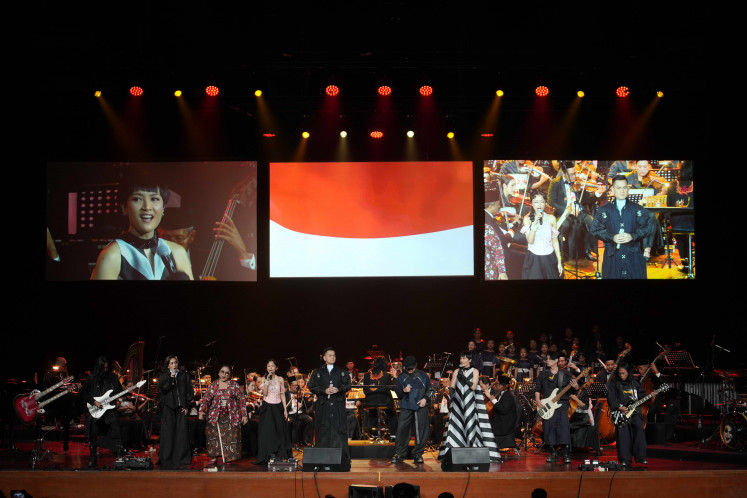Popular Reads
Top Results
Can't find what you're looking for?
View all search resultsPopular Reads
Top Results
Can't find what you're looking for?
View all search resultsSoccer Friday: The homegrown coach who put pride back in the Malaysia shirt
Dollah Salleh has a chance to earn Southeast Asian soccer immortality if he can turn around Malaysiaâs 2-0 deficit against Thailand in the second leg of the AFF final in Kuala Lumpur on Saturday
Change text size
Gift Premium Articles
to Anyone
D
ollah Salleh has a chance to earn Southeast Asian soccer immortality if he can turn around Malaysia's 2-0 deficit against Thailand in the second leg of the AFF final in Kuala Lumpur on Saturday. As his predecessor will tell you, lifting the Suzuki Cup can change your life.
In 2010, K. Rajagobal defied the odds to win the two-legged final against tournament co-hosts, Indonesia. His side was thrashed 5-1 in the group stages at Jakarta's Gelora Bung Karno Stadium and yet turned the tables when it mattered three weeks later.
By upsetting favorites Indonesia, Malaysia had won the ASEAN tournament for the first time at the eighth attempt. Prime Minister Najib Razak declared a public holiday and Rajagobal received a Datukship ' the nation's equivalent of a knighthood.
Four years on, Dato Rajagobal sits in front of me in a vegetarian cafe in Kelana Jaya, near Kuala Lumpur. His eyes are flashing as he remembers the crucial 3-0 victory in the 2010 home leg over Indonesia that set up his proudest soccer moment.
'I saw 100,000 thousand fans, each and every one of them holding a Malaysian flag ' such an amazing moment,' he said. 'It was the finest time of my career when those three goals were scored in the second half at the National Stadium. It was electrifying.'
Malaysia lost the away leg 2-1 in Jakarta, but prevailed 4-2 on aggregate. In the 2014 final, it will need a resounding home victory after a 2-0 defeat to Kiatisuk Senamuang's impressive Thailand side in Wednesday's first leg in Bangkok.
Some of the same players who appeared in the 2010 tournament and were blooded under Rajagobal ' he coached several Malaysian junior teams before being appointed to the top job in 2009 ' are also in Dollah Salleh's seasoned squad. Veterans Amri Yahyah, Safee Sali, Safiq Rahim and S. Kunalan have all made significant contributions, just as they did four years ago.
'It's the core of the same players from 2010 and as a coach you feel proud for the team,' Rajagobal said. 'So far, Dollah Salleh has done a good job tactically. I'm really happy that they've performed at a certain level to make the finals.'
When Malaysia stunned the Asian soccer world with a 4-2 semifinal second leg victory over Vietnam on Dec. 11, Rajagobal was watching at a public venue in the state of Negeri Sembilan, south of Kuala Lumpur. At full-time, jubilant fans came up and congratulated him.
The efforts of his team in 2010 proved what was possible.
'I'm surprised that people recognize me all over Southeast Asia,' he said. 'Recently I went to Jakarta. I was asked to handle the ASEAN All Stars team playing against Indonesia [as a fund raiser for the victims of Typhoon Haiyan]. People still remembered me and asked to take photos at the hotel and when I went shopping. It's amazing.'
Rajagobal achieved breakthrough success 12 months before the 2010 Suzuki Cup when Malaysia's U-23 side won the Southeast Asian Games football gold medal for the first time in 20 years.
A skilled motivator who favors attacking football, he is credited with helping restore the confidence of Harimau Malaya after the embarrassment of the 2007 Asian Cup on home soil when they lost all three group matches ' scoring one goal and conceding 12.
As a locally born national coach who achieved more than a succession of highly paid foreign managers, Rajagobal is rightfully proud of his success. In four and half years in charge, he crossed swords with the likes of Arsene Wenger, Jose Mourinho, Kenny Dalglish and Roberto Mancini on Asian pre-season tours of top English Premier League sides.
Manchester United fan Rajagobal never felt inferior to the big names from Europe and believed that his views on football were equally valid.
Soon after his appointment in July 2009, he found himself on the touchline, opposing his hero Sir Alex Ferguson, in front of 90,000 fans in Kuala Lumpur. A brace from Amri Yahyah drew Malaysia level at 2-2 before a late goal from new signing Michael Owen gave the Red Devils a 3-2 victory.
Since the end of his Malaysian stint a year ago, Rajagobal has not worked as a professional coach. But he was strongly linked to the Vietnamese national team job before Japan's Toshiya Miura was appointed in May. King Raja says he'd like to get back on the saddle soon.
'I'm waiting patiently for the right option, the right offer,' he said. 'I'm open to any discussion. Not only local sides but I would like to coach another national team. If any of the other nations in the AFF Suzuki Cup are interested, I am open to talk and we will see from there.'
Rajagobal turns 59 next year but remains lean, fit and youthful. He carries the same weight and has a similar hairstyle to when he was a winger for the national team in the early 1980s. If Malaysia is able to win its second AFF title this weekend, it will owe a debt of gratitude to the man who helped put the pride back in the yellow-and-black shirt.
______________
Jason Dasey is senior editor of ESPN FC, Indonesia's most popular English language soccer website with a new SE Asia edition and a daily Indonesian language TV show on NET. Twitter: @JasonDasey











